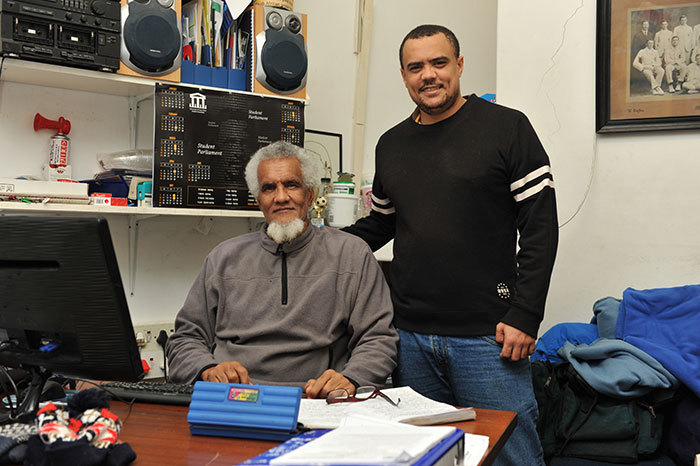Education can help us forge a new history
15 June 2015 | Story by Newsroom
Karl Buckton, an MPhil graduate in environmental science – and Peter Buckton's son – grew up in the education system that emerged out of South Africa's transitional moment in the 1990s. He comments on the youth of today and the educational opportunities currently available.
HS: Please tell me about yourself and how you came to UCT.
KB: I was born in 1987 and grew up in Westridge, Mitchells Plain. I still live there. I attended Parkhurst Primary School in Westridge and Cape Town High School. I completed my undergraduate degree at UCT in sociology and environmental studies in 2007 and then completed an honours degree in environmental studies in 2008. I took a break from the environmental field to pursue a management diploma at the Department of Management Studies in the commerce faculty. This diploma had a specialisation in sport, which is my passion. I completed that in 2009. After a two-year break I started an MPhil in Environment, Society and Sustainability in 2012, which I've just completed.
HS: Growing up, were you aware of the significance of 1976 as a watershed year for education in South Africa?
KB: Yes, I was aware of the 1976 uprisings through school events or on days to commemorate the uprisings. The Youth Day public holiday made me aware of the uprisings as well.
HS: How do you think this event shaped youth's approach to education and particularly language?
KB: I think the 1976 uprisings gave the youth a voice, and confidence to fight for what was right at the time. Good education shouldn't be a battle, it should be a given that everyone in South Africa, from primary school to tertiary education, receives the best education possible. How that is achievable by government is complex, considering the socio-economic disparities in the country. Language is a particularly important choice for learners. A learner should not be taught in a language that stifles their development. They should be able to have the best education in the language they prefer.
HS: As a young graduate, do you think we have done enough in the past 39 years or have we failed the students of today?
KB: Everything that we have achieved in this country has to be seen as an improvement since the end of apartheid. There are still major issues with regards to education in this country and I think we still have to keep improving. Even if the perception is that education was better during the apartheid years, I would prefer to choose gradual improvement in a democratic society than good education in an oppressive regime.
I know that South Africa spends a lot of money on education – we are one of the top five countries in Africa in education expenditure – but is it translating into higher quality? And then the education curriculum has constantly changed over the past 10 years. The uncertainty and instability surrounding the education curriculum is a frustration for learners.I also feel that universities should play an active role in secondary education. I remember being in matric and doing subjects that were important at that time but which didn't ultimately affect my university choices. I think universities can play a more active role in designing a schedule for matrics, in conjunction with secondary schools, in working on specific requirements for tertiary education entry.
HS: What should we be doing at universities as an academic community as we grapple with real issues to do with race, class, gender and language in education?
KB: I think as part of the academic community at UCT, we need to tackle the issues of racism in society. We still use terms such as black, white, coloured and Indian. Why? Education can afford us the privilege of understanding history and forging a new history for the country.
Language is important as well at universities. At UCT, most of the courses are taught in English, which is a problem for learners who are not of that native tongue. Universities should diversify; we have 12 official languages, and we cannot just offer courses in one or two languages.
HS: How best can the youth honour the events of 16 June 1976?
KB: We can honour the events of 1976 by continuing to have a voice and fighting the wrongs. The youth today should stand up and ask tough questions of the relevant agencies in relation to the quality of education.
HS: Do you believe students understand the history and events of Soweto Day?
KB: I would assume that the students understand the legacy of those events. But during the recent protests about the removal of the Rhodes statue, conversations I had with fellow students indicated they didn't understand why other students were protesting. I hope that if they're not aware of Soweto Day, they'd attempt to inform themselves about events in 1976.
Interview by Helen Swingler.
Return to 1976 – lost and found main story
 This work is licensed under a Creative Commons Attribution-NoDerivatives 4.0 International License.
This work is licensed under a Creative Commons Attribution-NoDerivatives 4.0 International License.
Please view the republishing articles page for more information.










